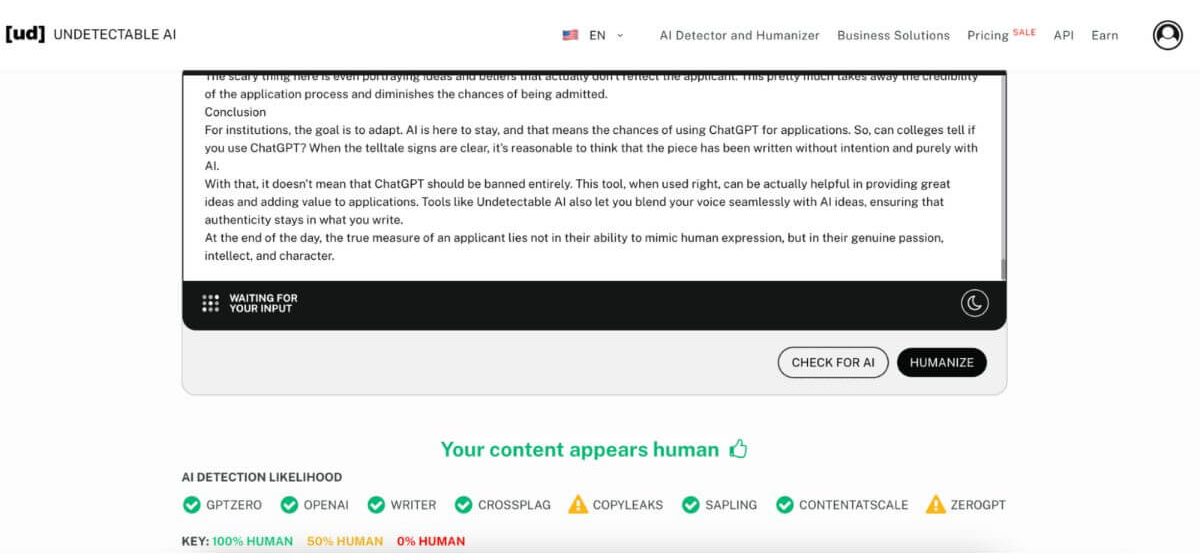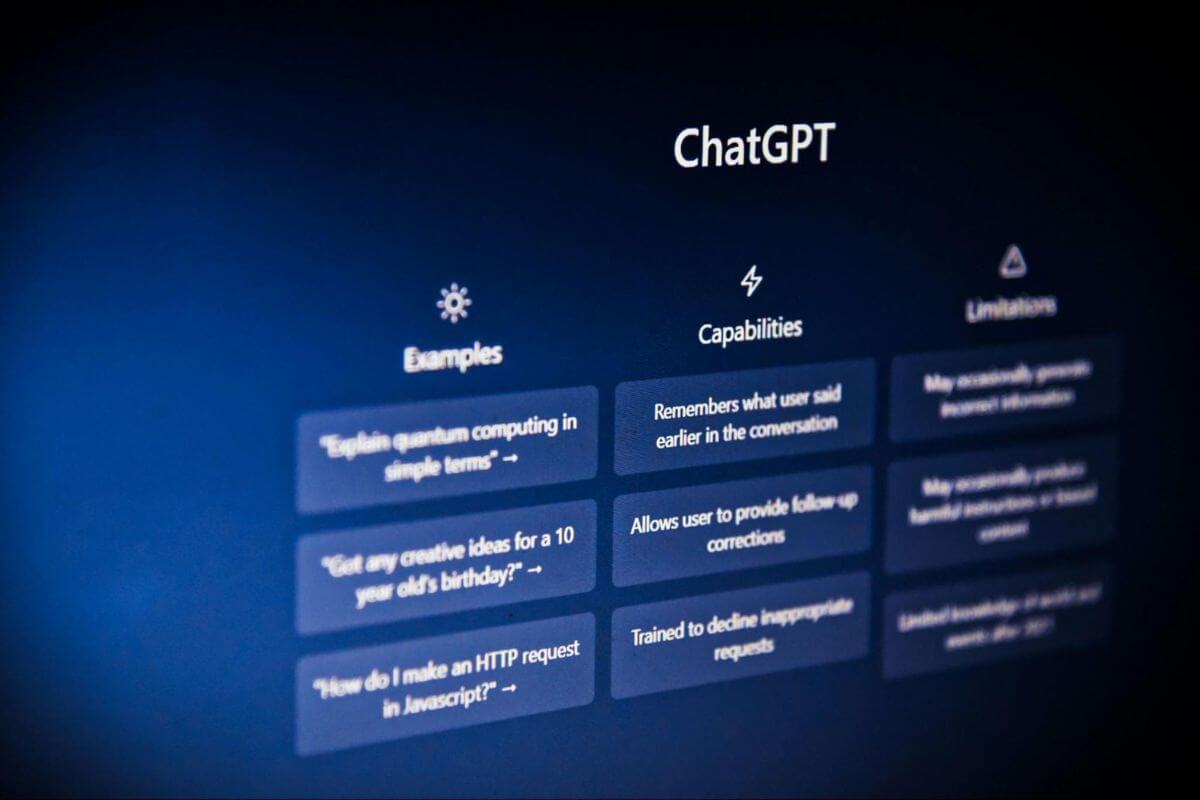Just like the calculator made computing easier than doing it by hand, many organizations are now leveraging AI to streamline processes.
More than half of teachers today believe that AI has a positive impact on the teaching and learning process.
So, without a doubt, AI can be used the right way for institutions.
Seeing how this powerful tool works so well for many already, you might want to try using AI to streamline your college application.
But do colleges know if you use ChatGPT? Here’s everything you should know.
Can Admissions Officers Detect the Use of ChatGPT in Applications?
While it’s true that 92% of institutions have AI in the workplace, it doesn’t mean that they completely rely on it. That applies to college applications, too.
The answer isn’t crystal clear, so we’ll go over both the yes and no’s. Admissions officers have worked for years as a living lie detectors.
They’ve most likely read hundreds, if not thousands, of essays already. What’s being analyzed the most here is authenticity.
Never Worry About AI Detecting Your Texts Again. Undetectable AI Can Help You:
- Make your AI assisted writing appear human-like.
- Bypass all major AI detection tools with just one click.
- Use AI safely and confidently in school and work.
This is why AI-generated content can be a scary thing for college admissions. It’s also most likely that the narrative voice won’t match the applicant’s age and experience level.
A major red flag is an over-polished application essay. In most of these cases, no fancy algorithms are needed – old-fashioned instincts are more than enough to detect that the work is made using AI.
So, how can AI go undetected? Remember that AI generated content works only if you use it alongside your authentic work, not as a replacement.
This is the magic of strategic intelligence. You input the knowledge you’re confident about while infusing your individuality, and then allow AI to work as your handy tool for creating seamless content.
Just like institutions, you also have access to anti-plagiarism software and AI detectors like Undetectable AI to check if the text you generated is flagged as AI content.
What’s great about Undetectable is that it can effectively humanize your content, so text that you’re not confident in will have that needed authenticity.
Though admissions teams might not be constantly running “AI checks” just yet, it’s best not to completely rely on ChatGPT to do the work for you.
After all, isn’t applying for your dream college fueled by genuine passion? Never let that go, and let your voice shine through as you send your application.
How are Colleges and Universities Responding to AI?
You might have heard that many large districts have outright banned the use of AI (mainly ChatGPT) because of initial concerns about cheating.
But that was a while ago, and the wind has shifted. Many are now choosing to adapt.
New York City Public Schools, for instance, see AI as a way to change the mindset and embrace its potential.
Many AI detectors are also quite faulty, with a student even being falsely accused of making AI generated content.
How does this apply to colleges and universities? Instead of banning AI tools, many are figuring out ways to work with them.
Here’s what’s happening:
- There’s an ethical way of using AI, and students can be educated on its proper use – brainstorming, citing sources when using it, or checking grammar.
- Educators talk about consent, requiring proper credit if an AI tool is used to finish a project.
- Some projects and teaching applications actually fully utilize the power of AI to create enhanced learning experiences.
- Deciding on a case-by-case basis whether students can use AI to finish a project.
- There are ongoing AI implementations in colleges to streamline curriculum development, administrative tasks, and communication.
Generative AI won’t be going away. So, promoting an environment of AI-infused learning and teaching instead of threatening tradition can help advance institutions (potentially even providing a competitive advantage).
Can You Use ChatGPT for College Application Essays?
There’s an interesting piece written by The Washington Post about whether ChatGPT can get into Harvard.
They had a prompt engineer on board to see if an AI-generated admissions essay would work.
Well, it didn’t. Why?
There are telltale signs why ChatGPT doesn’t work for writing:
- There’s a lack of storyline and authenticity that makes your essay who you are.
- Most points don’t have context and evidence, usually just coming out as vague and suspicious.
- A certain polish that feels too robotic, without the natural imperfections (not grammatical mistakes) that add character.
- Repetitiveness and predictability, because AI can’t write something that can surprise the reader.
- Because AI pulls the majority of its data from a more Western point-of-view, stereotypes are used resulting in AI bias.
- The style of writing just doesn’t fit the applicant – like if you’re applying for a college, but the way the essay is written sounds way too highfalutin.
Your application essay should showcase you. Don’t focus on how you can make your completely AI-written content pass as human.
Use AI as Writing Assistants, Not Writers
Using ChatGPT for college essays can be a double-edged sword. While AI can make your work look polished, it can strip away the authenticity your dream institution is looking for.
What’s best here is to properly utilize AI as your writing assistant. You could always use an extra set of eyes (even digital ones) to check how your work looks.
If you’re in doubt, some of the AI ideas you really want to include in your essay can also be (carefully) effectively humanized.
For your peace of mind, here are some common ways that let you use AI the right way, keeping it as your writing assistant rather than handing it the quill:
- Ask AI to suggest themes and concepts that you could use for your initial ideas.
- Develop an outline for your piece so you can have an idea of how your essay will flow.
- Let AI scan your work for grammatical errors or awkward phrasing.
- Consult AI to choose the right words for your essay without having to compromise your personal style.
Keep in mind that honesty is important with your application, so value your original thoughts above all else. Your college application should still be created by you.
Questioning Ethical Boundaries
Many students are turning to using AI to simplify their work. And despite knowing the implications of using ChatGPT, one in five college students uses it anyway.
This is an issue across the board because AI is so readily available.
The main concerns here are the lack of research, critical thinking, and analysis – just relying on a few prompt requests and a push of a button.
Many applicants might consider this path from the onset of their college journey.
The lack of authenticity, for instance, results in passive recipients who lack the passion and drive to pursue their education.
Moreoever, relying solely on AI can compromise critical academic skills. Not disclosing the use of AI can be seen as deceptive, even.
This destroys the trust during the admissions process.
With these points considered, it’s important to establish ethical considerations to ensure that AI tools don’t cause harm across the board.
Here are some key ethical boundaries to keep in mind:
- Avoid sharing sensitive or confidential information with ChatGPT. Conversations and other personal data are recorded to train the app.
- Especially when dealing with sensitive topics, be mindful of the potential AI bias with the generated responses.
- Completely avoid using AI for illegal, unethical, and malicious purposes.
- Regardless of whether you submit AI generated content or not, be sure to provide proper citations and acknowledgments of your sources.
- Don’t use ChatGPT to embellish and fabricate personal experiences, achievements, and qualifications. Only provide truthful information.
- Take note that your college application is a journey towards personal growth, so be aware of how you use AI tools to best portray who you are.
- College life is tough, and relying solely on AI will not be enough to get you through it.
AI tools like ChatGPT can assist with writing, but you have to make sure the content submitted in college admissions essays stays authentic and original.
The Risks and Consequences
When applicants know they can write their applications using ChatGPT, it’s easy to ignore the easily overlooked but glaring risks. There’s a huge ethical dilemma at play.
Let’s just say that you can expect to get rejected if you use AI exclusively as your writer.
One of the biggest risks here is plagiarism. Without checking, you could miss out on AI using other people’s content.
Undetectable AI serves as an AI detector, checker, and humanizer all in one.
With Undetectable by your side, you can incorporate the AI ideas that work best with your application while making sure it’s still uniquely yours.
There’s also the risk of insincerity. Purely relying on ChatGPT will result in a lack of personal investment and genuine expression, even pretending someone they’re not.
The scary possibility is portraying ideas and beliefs that actually don’t reflect the applicant.
This pretty much takes away the credibility of the application process and diminishes the chances of being admitted.
Conclusion
For institutions, the goal is to adapt. AI is here to stay, and that means there are greater chances of applicants using ChatGPT. So, can colleges tell if you use ChatGPT? Sometimes.
When the telltale signs are clear, it’s reasonable to assume the piece has been written without intention and purely with AI.
But it doesn’t mean that ChatGPT should be banned entirely. When used correctly, it can provide great ideas and add value to applications.
Tools like Undetectable AI also let you blend your voice seamlessly with AI ideas, ensuring that authenticity stays in what you write.
You can try Undetectable AI easily with the widget below. Just input your text and watch as it transforms into a more humanized and polished version.
At the end of the day, the true measure of an applicant lies not in their ability to mimic human expression but in their genuine passion, intellect, and character.





